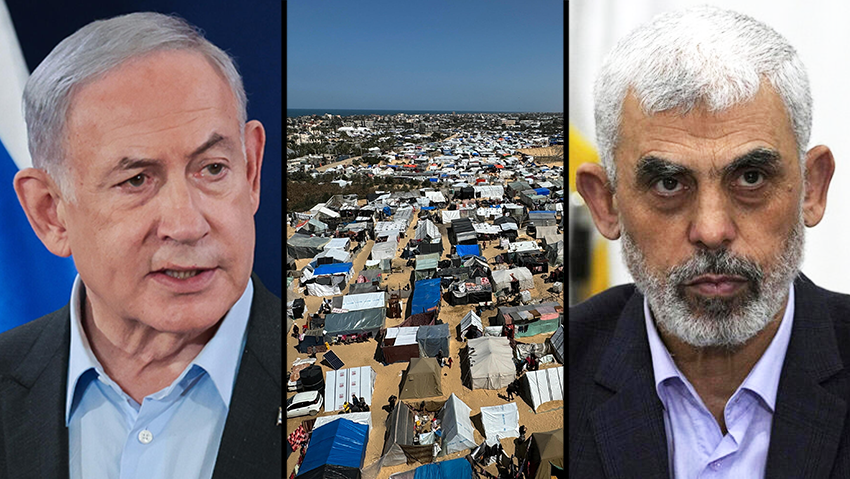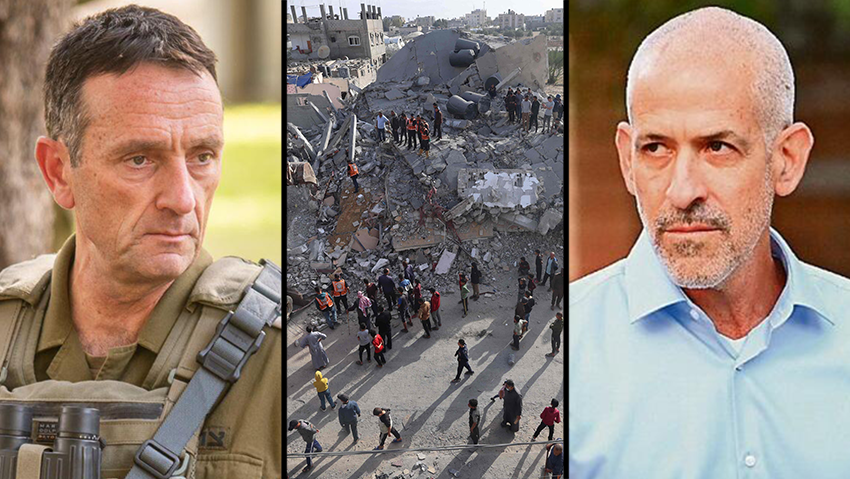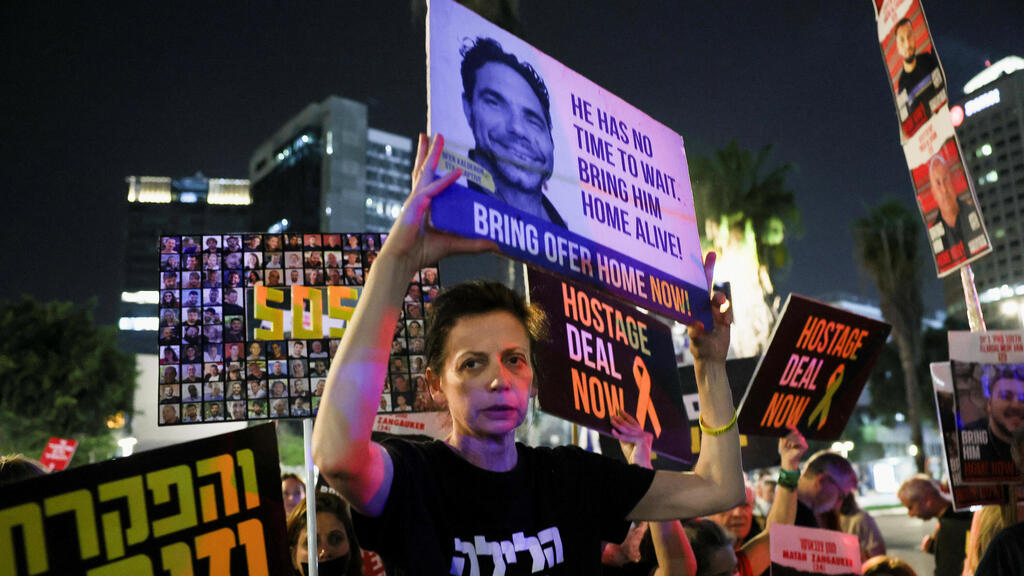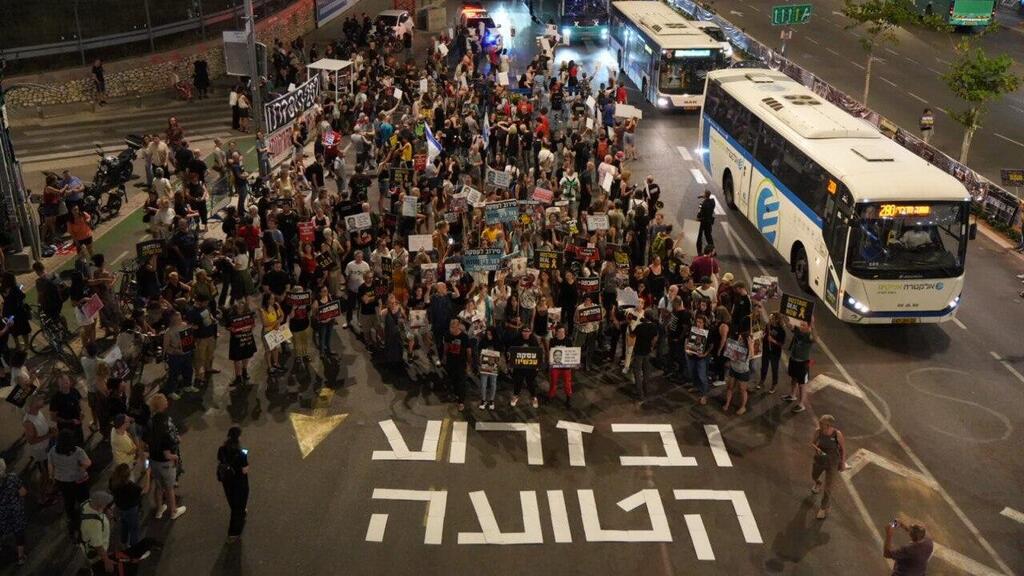Israel’s War Cabinet met on Thursday and approved allowing the negotiation team to hold talks with the Egyptian delegation set to arrive in Israel on Friday out of a genuine desire to reach a hostage deal, despite the threat of an imminent Israel Defense Forces military operation in Rafah.
Israel believes that the Rafah operation is of great importance, as it could exert pressure on Hamas while its leader in the Gaza Strip, Yahya Sinwar, fortifies his positions and demands an end to the fighting as a condition for a deal.
Israel has proposed the release of "dozens of prisoners," but fewer than the 40 that had previously been under discussion. A source familiar with the details said of the deal on the table that the release of 33 hostages is currently being discussed who fit the 'humanitarian' category, including women, the elderly, sick individuals and those with mental trauma. Accordingly, Israel demands that Hamas' relief period be shorter than six weeks, as was discussed by the parties until now.
According to Israeli sources, Egyptians fear "war refugees" entering Sinai following an Israeli incursion into Rafah, hence their rush to propose a deal and replace Qatar as a central mediator, in the hope that this might lead to a postponing of the operation, as reported earlier by local media outlets in Cairo.
Several alternatives for a hostage release plan were presented to the War Cabinet. The negotiating team received a "green light" to make the Israeli position more flexible so that a deal could be reached quickly in case the military pressure proves to be enough.
4 View gallery


Benjamin Netanyahu, tents in Rafah, Yahya Sinwar
(Photo: REUTERS/ Bassam Masoud ,AP, מארק ישראל סלם)
Israel was willing to accept a six-week relief period for the release of 40 prisoners previously, and now the relief period under the new proposal would be shorter. Jerusalem is expressing readiness to compromise on the issue of withdrawal from the Netzarim Corridor, one of the demands Israel has met so far but is now willing to alter following Hamas' stubborn refusal.
However, an Israeli official explained that Israel is looking for ways to turn the smaller deal into something that will trigger a larger move. He also added that the talks would be held in stages between the Egyptian delegation and representatives of the Mossad, IDF and Shin Bet, so "things need to be taken in proportion." According to the official: "Ultimately, these aren’t talks between Israel and Hamas, but between Israel and Egypt."
The official argued that Israel is "very serious" in its intention to enter Rafah, but if there is a "genuine proposal rather than ploys by (Hamas leader Yahya) Sinwar," it will be willing to reconsider the operation. However, he clarified: "We won’t compromise on stopping the war."
The War Cabinet also discussed the need for a "strong military arm" to exert pressure on Hamas - which aligns with the planned operation in Rafah. Such a move raises serious concerns in Egypt, which is now making serious efforts to prevent a military operation in the city, while simultaneously revitalizing contacts for a deal. The center of gravity has now shifted to Egypt after Qatar didn’t meet its commitments and failed to pressure Hamas.
4 View gallery


IDF Chief of Staff LTG Herzi Halevi, Gazans in the Strip, Shin Bet Chief Ronen Bar
(Photo: Photo: IDF Spokesperson's Unit, MOHAMMED ABED / AFP, EPA / ABIR SULTAN)
A senior Israeli official told Ynet that "there is no contradiction between operations in Rafah and negotiating a hostage release. As we approach Rafah, Egyptian involvement naturally increases, but they have always been a dominant factor with whom we maintain weekly contact. They directly connect to Gaza and are critical to the Gaza Strip's future." He clarified that "We are heading to Rafah without a doubt, but we will exhaust every chance to bring hostages home."
The senior official added: "There is hope that the Egyptian route will evolve positively. We need to try every possible way. Egypt has been part of the mediation efforts for a long time. Now they are highly motivated because they want a deal, so we must maintain optimism, especially as the Rafah lever is being raised and approaches."
Shin Bet chief Ronen Bar and IDF Chief of Staff Herzi Halevi visited Cairo on Wednesday and met with Egyptian intelligence chief General Abbas Kamel, who presented a new Egyptian proposal to reach a hostage deal and end the war, consisting of three interconnected clauses.
Under the first clause of the Egyptian plan, Israel will commit to halting all preparations for the Rafah operation. The Egyptian intelligence chief clarified that not only Egypt but also the United States and the European Union fear for the fate of the civilian population in the event of an Israeli incursion into southern Gaza.
The second clause is the release of all Israeli hostages in two stages, over a 10-week period. It is important to note that Egypt did not specify the number of Israeli hostages (apparently their number is unknown to Egypt) but clarified that this is the release of "all hostages" in exchange for the release of hundreds of Palestinian prisoners and terrorists.
The third clause is a full cease-fire for a year, during which Israel and Hamas commit not to fire or use weapons on land and in the air. The declaration of the cease-fire will mark the beginning of steps toward the establishment of a Palestinian state. The "patrons" of this declaration will be the United States, Egypt, Jordan and the Palestinian Authority.
From Cairo, it was reported to Ynet and Yedioth Ahronoth that Bar and Halevi did not respond to the Egyptian plan but committed to presenting it for discussion with Prime Minister Benjamin Netanyahu and the Security Cabinet.
Hamas, it was further reported, conditions the implementation of the plan by declaring a full cease-fire on both sides for a year. Hamas also told Egypt it demanded to obtain an American and international guarantee for the Israeli implementation of the Egyptian plan's clauses. According to the new proposal, Hamas demands the release of 50 prisoners in exchange for each captured soldier, and 30 prisoners for each captured civilian.





